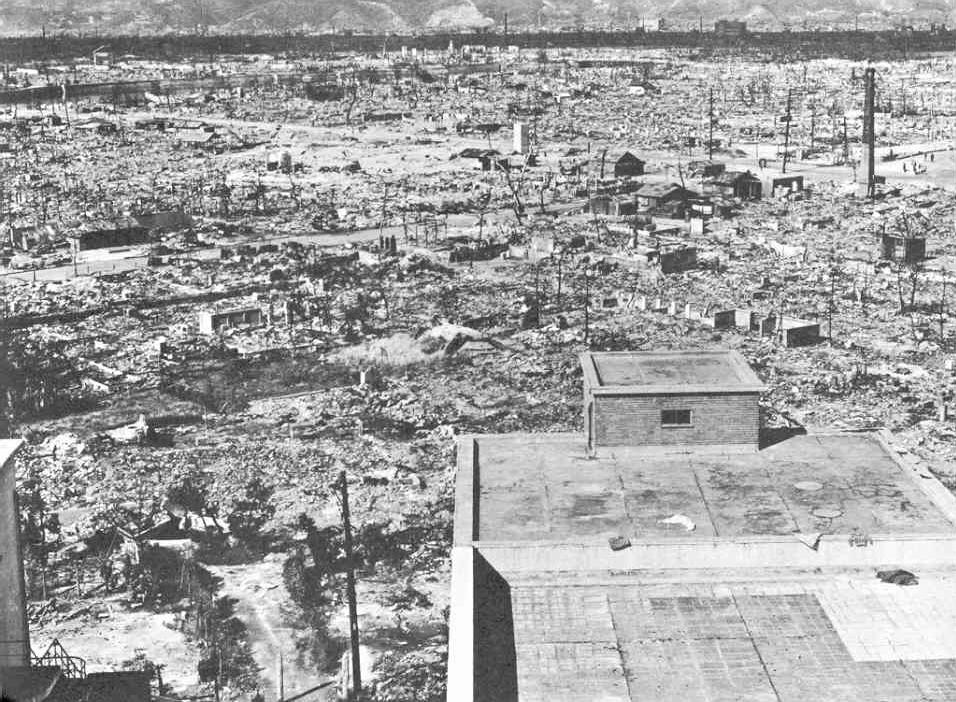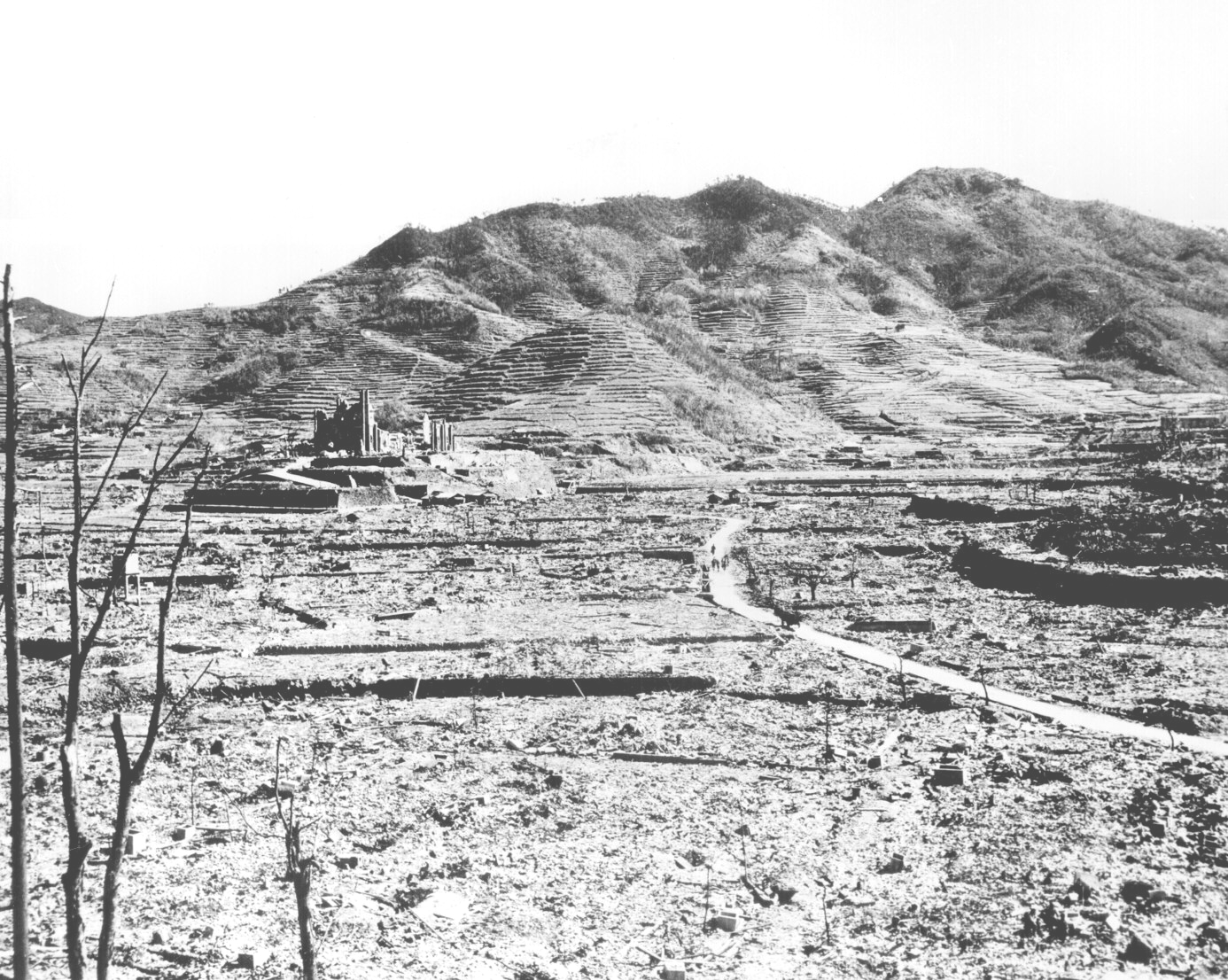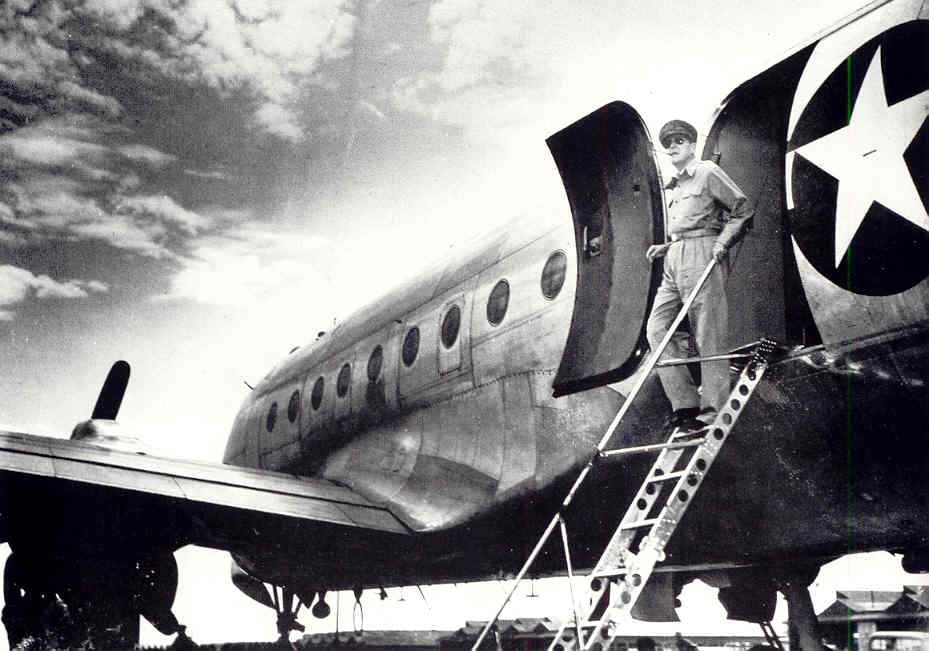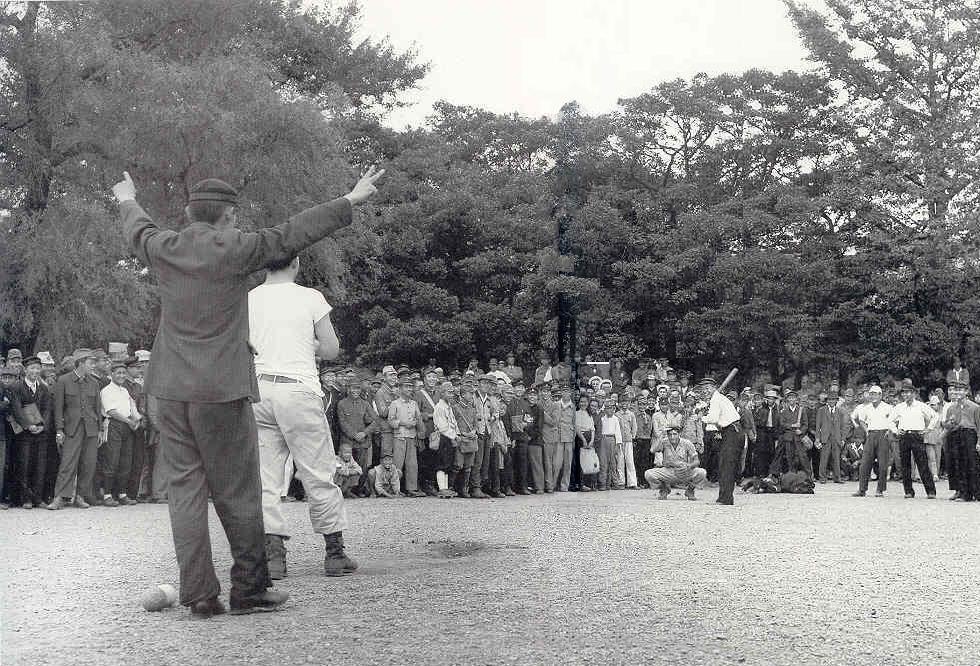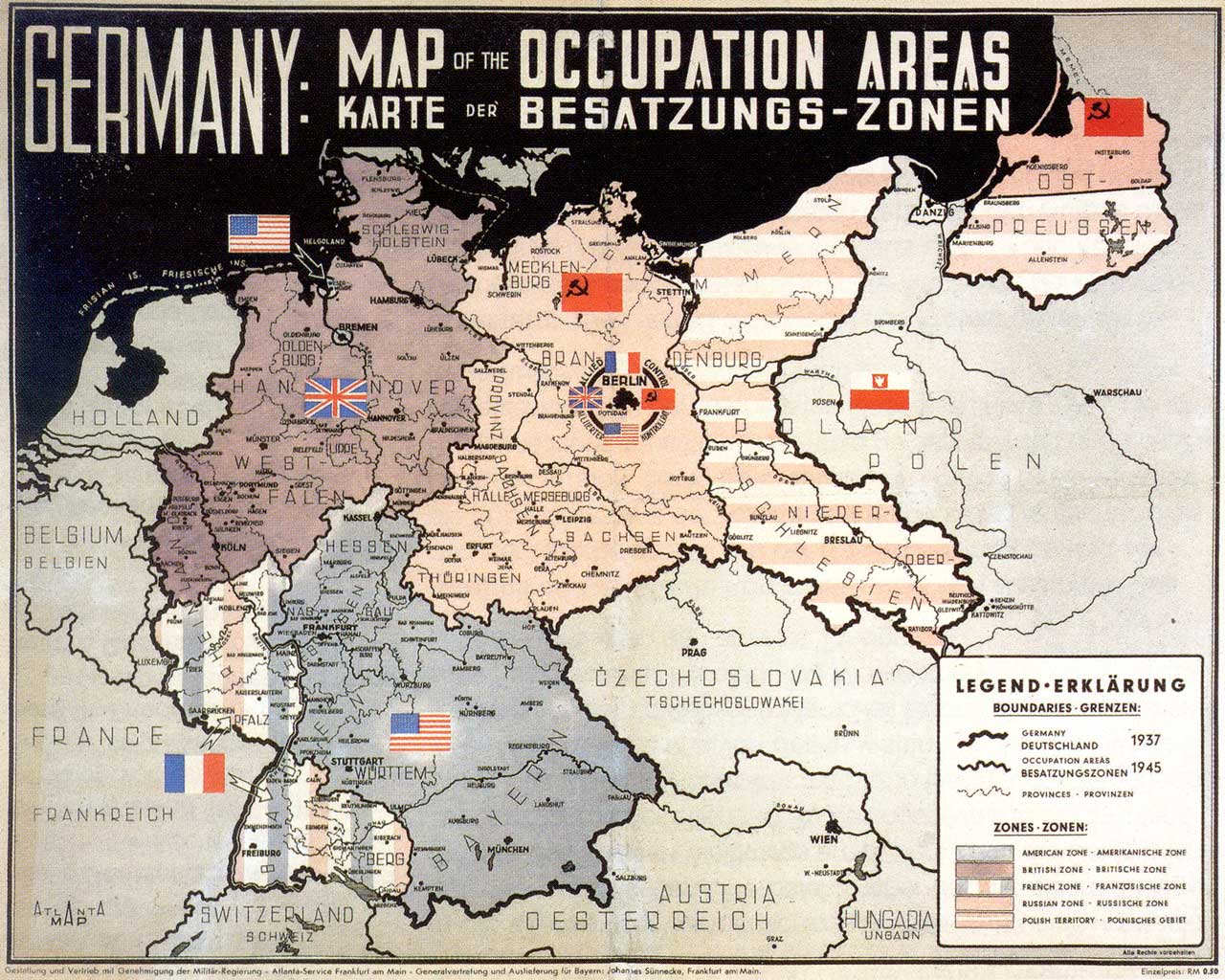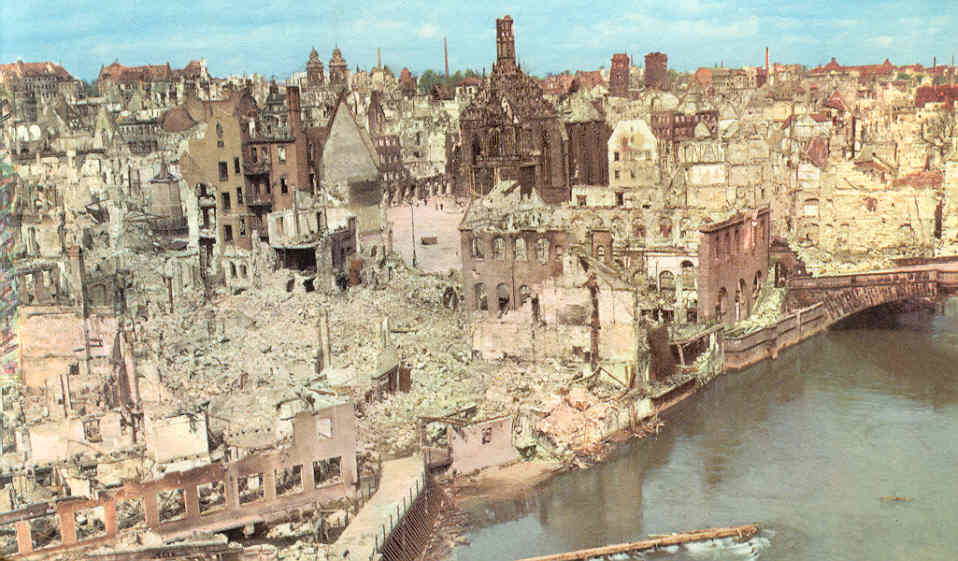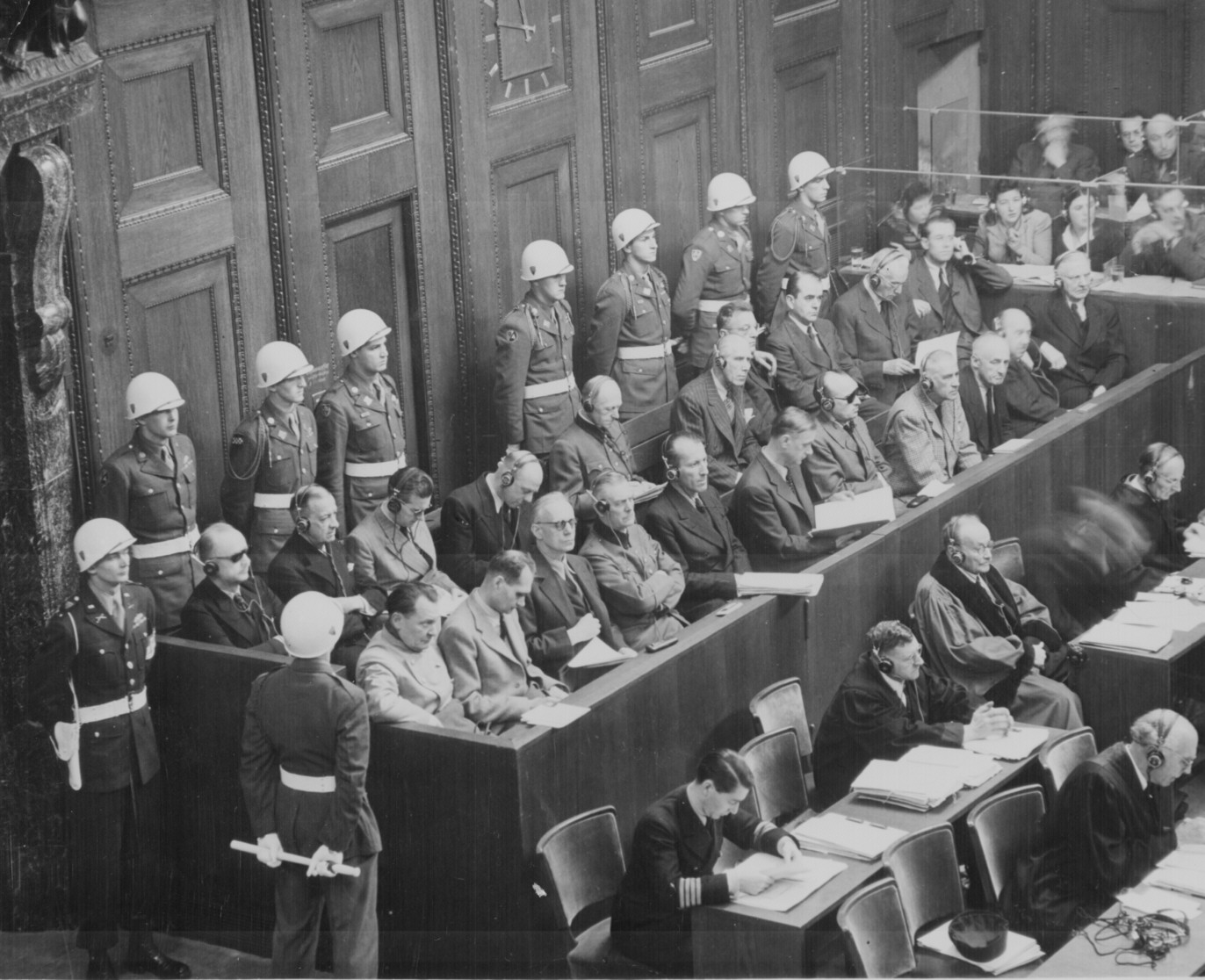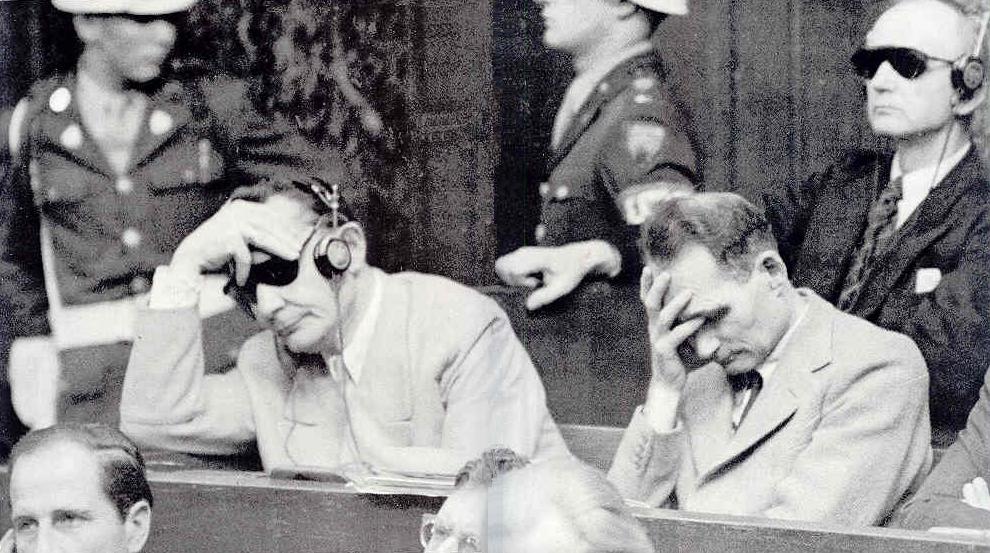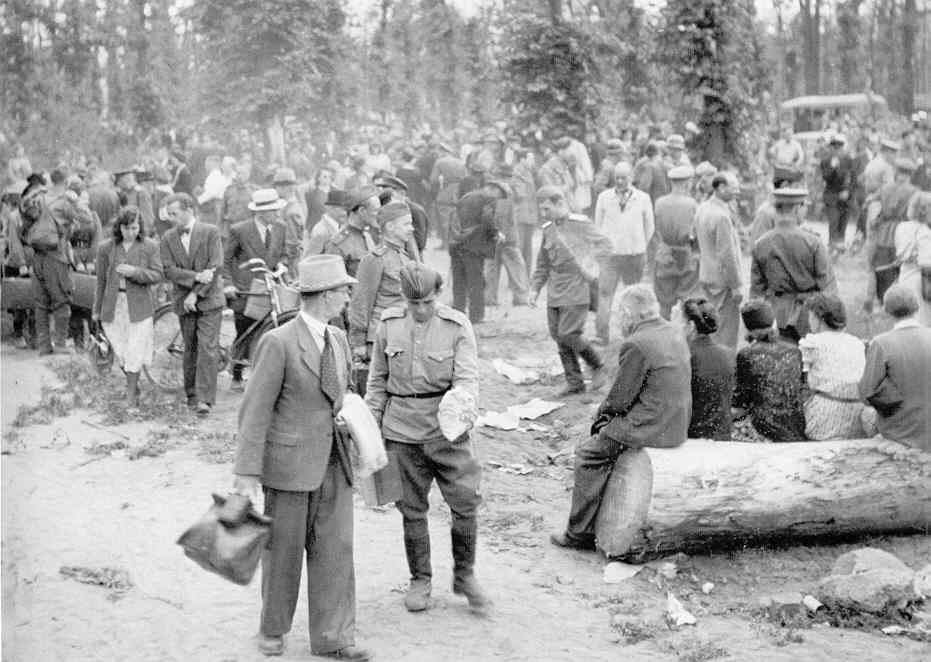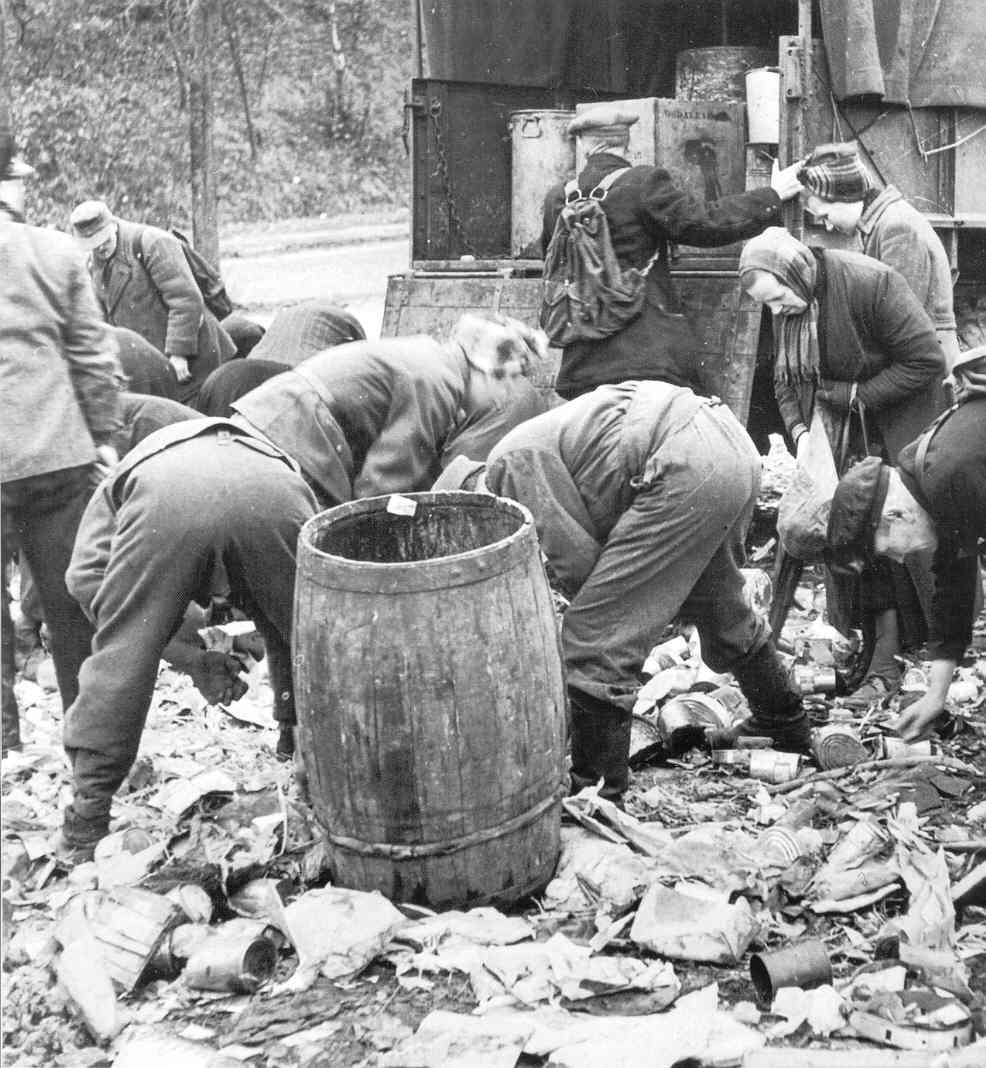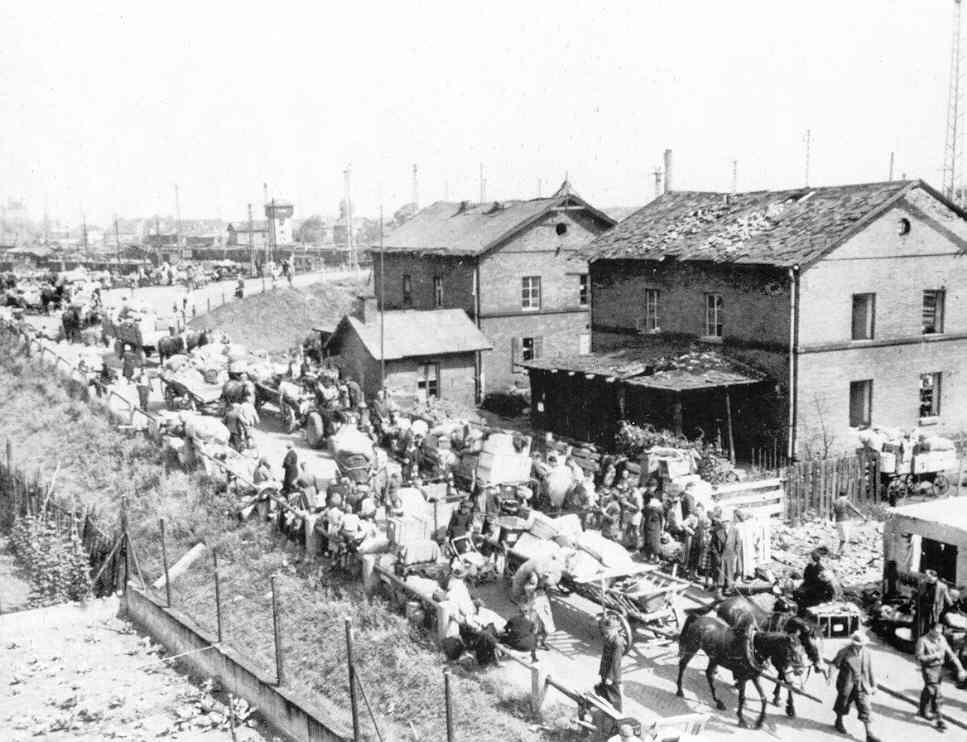19. A COLD WAR DEVELOPS

A GROWING SENSE OF AMERICA'S GLOBAL RESPONSIBILITIES

A GROWING SENSE OF AMERICA'S GLOBAL RESPONSIBILITIES
 Occupation and demobilization of Japan
Occupation and demobilization of Japan
 Occupation and demobilization of
Occupation and demobilization of
Germany
 The Europeans struggle to survive and
The Europeans struggle to survive and
dig out
 The peace treaties with the other former
The peace treaties with the other former
enemy nations
 The new United Nations wants to put in
The new United Nations wants to put in
place a peaceful world order
The textual material on this webpage is drawn directly from my work
America – The Covenant Nation © 2021, Volume Two, pages 53-56.
OCCUPATION AND DEMOBILIZATION OF JAPAN |
|
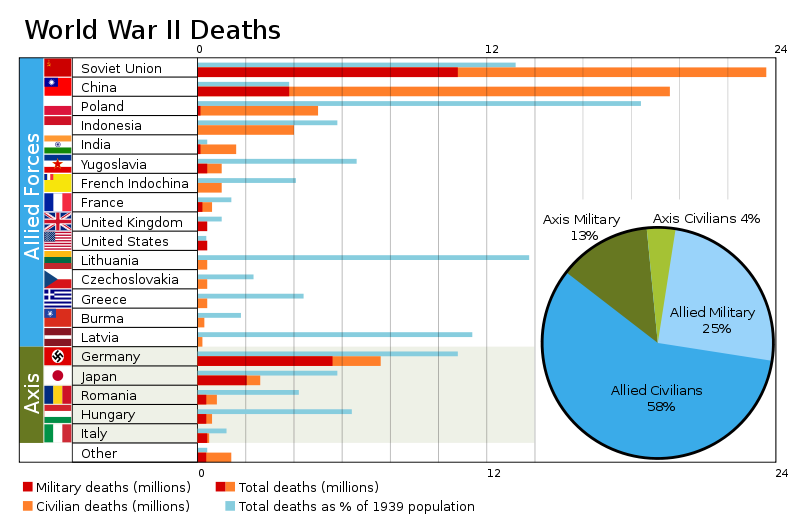
|
Five countries suffered the deaths of more than 10% of their population.
Wikipedia – "World War II"
|
Taking over the former Japanese Empire
The situation in Asia and the Pacific at the end of the war was fairly straightforward. The Americans, the Chinese, and the British and their Commonwealth partners (Australia and New Zealand) were largely of one accord on matters; the Russians entered too late to have much to argue about (though they did get quite a nice compensation for a week's worth of wartime effort!); and the French and Dutch were so enfeebled by the war that although they wanted to hang on to their empires in Southeast Asia, they could bring little muscle to the effort. A major question that hung over Japan in defeat was what to do with Japan's wartime leaders, considered widely among the Allies as international criminals. Most critical of all was the matter of the status of the Emperor Hirohito. Many Allies felt that he was especially guilty of war crimes because of his guidance and support of the Japanese military that had assaulted and plundered Asia and the Pacific. But Truman (as well as the American commander General Douglas MacArthur) understood that governing a post-war Japan would be very difficult without the cooperation of local leadership, in particular the emperor. Thus MacArthur headed off investigations destined to implicate the emperor in war crimes. Indeed, MacArthur stood strongly with the emperor in redirecting his place in Japanese society away from his former god-like status, to a status more akin to Europe's constitutional monarchs. And the emperor was himself willing to switch to this new role, presenting himself before the public at various events, even taking walks through the streets of Japan's cities and towns to meet his people personally. The Japanese themselves seemed to be quite okay with this change in the character of their government, and indeed seemed to switch rather quickly from a dedicated hostility to America and things Western, to a willingness to adapt to and even learn from their new occupiers. Consequently, Japan made the transition to the post-war world without the major traumas that much of Europe encountered. Another factor in the smooth transition was American General MacArthur. He had previously spent considerable time along his career path operating within Asian culture, and possessed an important amount of knowledge about Asian culture and its priorities. Thus he himself easily took up the role Asians expected of their leaders: noble, strong in will, and with an obvious concern for the welfare of the society. In a way, Japan now had two emperors: Hirohito and MacArthur, who worked well together.
|
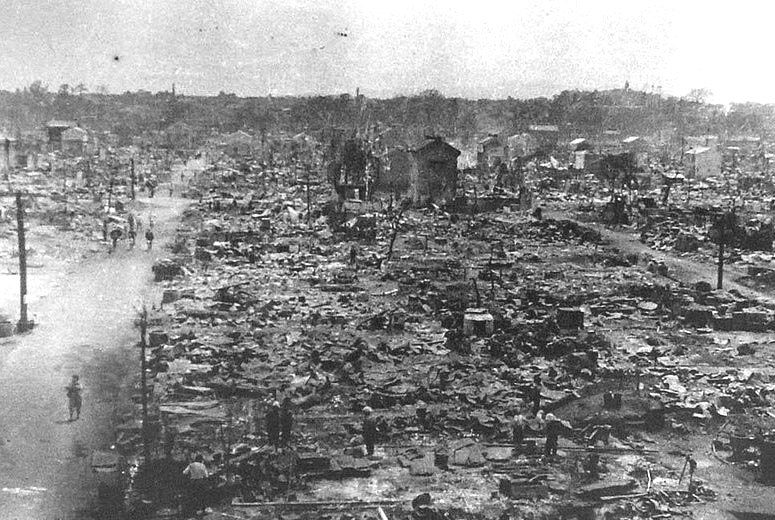
Tokyo ... after the firebombing of March 1945
U.S. Air Force
National Archives 77-AEC-52-4459.
U.S. Army
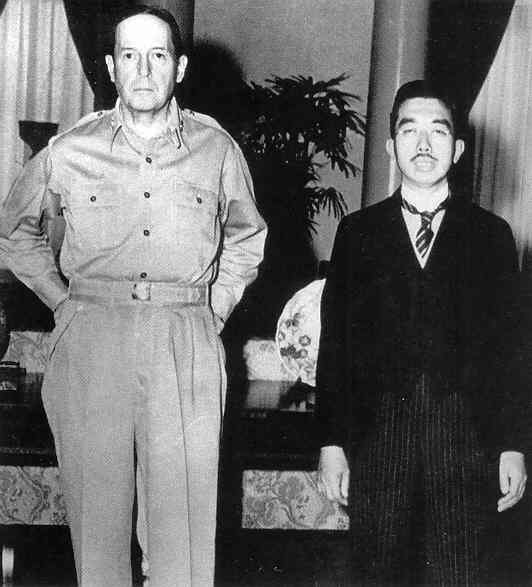
National Archives NA-208-N-46403-FA
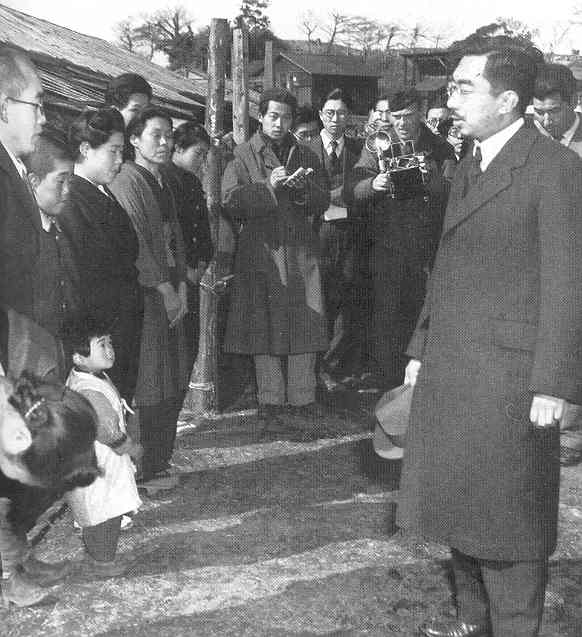
U.S. Army
OCCUPATION
AND DEMOBILIZATION OF GERMANY |
|
The dividing of Germany
At the Potsdam Conference, the new German boundaries broadly agreed on at Yalta earlier that year had been finalized. Poland was awarded much of Germany's eastern lands (all the way west into the German heartland to the Oder and Neisse Rivers), given to Poland as territorial compensation for the eastern lands of Poland seized during the Soviet invasion of Poland in 1939, which were now formally recognized by the Americans and British as being permanently annexed to the Soviet Union. Additionally, much of old East Prussia (the heartland of the ancient German Teutonic or Prussian state) was divided in half, with the northern portion and its leading city of Königsberg given to Russia and the southern half to Poland. Also the German free city of Danzig was turned over to Poland. Germany itself, or what was left of it, was divided first into three zones, one in the East placed under Soviet supervision, one in the Southwest under American supervision, and one in the Northwest under British supervision. France wanted a zone in the West, bordering Germany, and Russia agreed to reworking the boundaries of the zones – as long as the French zone was drawn entirely from the British, and American zones. So it was that France also became an occupying power. The Berlin capital city, which was located entirely within the Russian zone of occupation, was itself divided also into four sectors: Soviet, French, British, and American. The Russians promised free access from the American, British, and French zones in the West through the Soviet zone to Berlin. As events would soon prove however, that would leave Berlin – even the sections of the city under joint French, British, and American control – in a very vulnerable position. Learning of these territorial transfers, masses of Germans living in East Prussia grew fearful of what would happen to them under their new Polish and Russian masters, and filled the roads as they fled west to what was left of Germany, even then trying to reach past the eastern or Russian sector (what would soon come to be called East Germany) in order to get to the West German (the American, French or British) sectors of a newly divided Germany. Hunger and intense suffering (even death) from winter exposure became widespread among a huge German refugee population. The Germans, however, expected little sympathy from the rest of Europe. They were on their own to face their new fate as fallen Übermenschen.
|
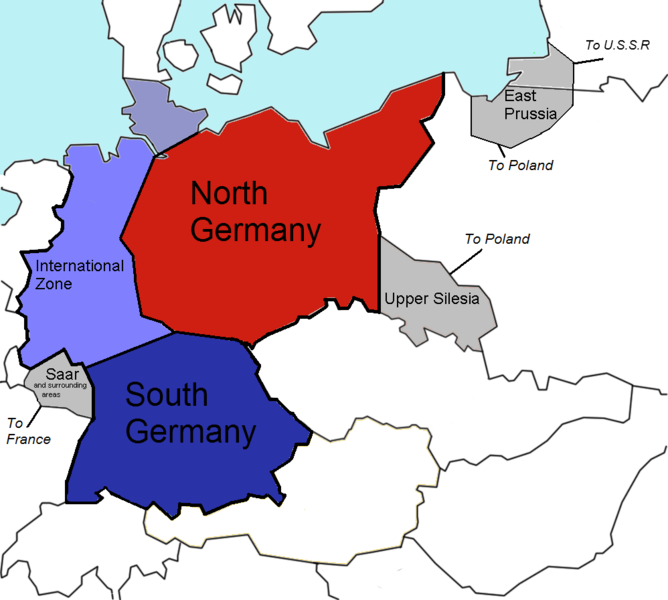
Wikipedia – "Allied-occupied Germany"
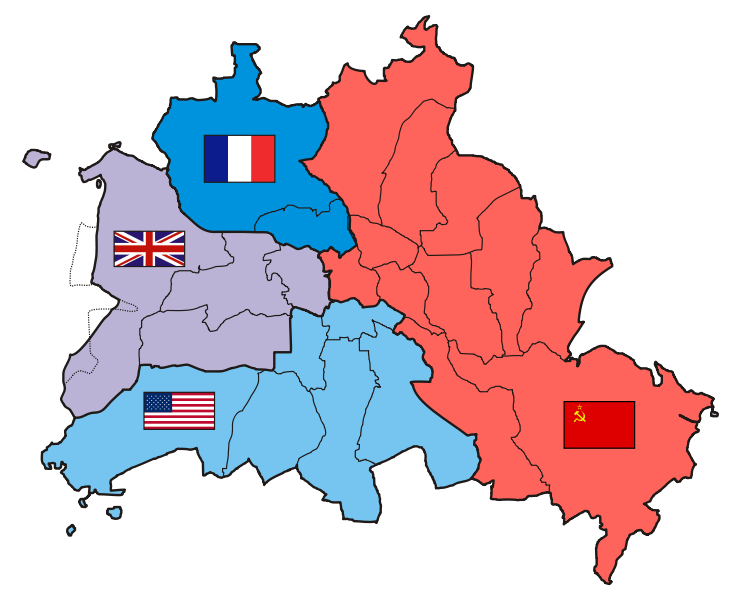
Wikipedia – "Allied-occupied Germany"
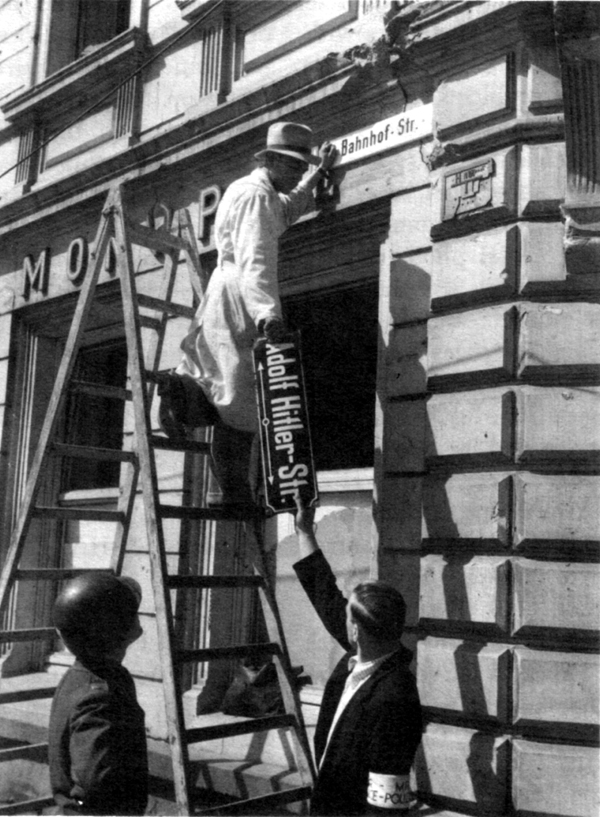
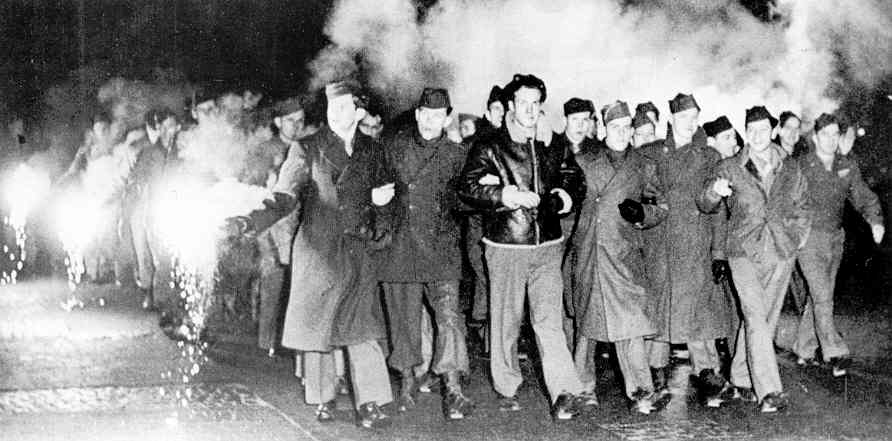
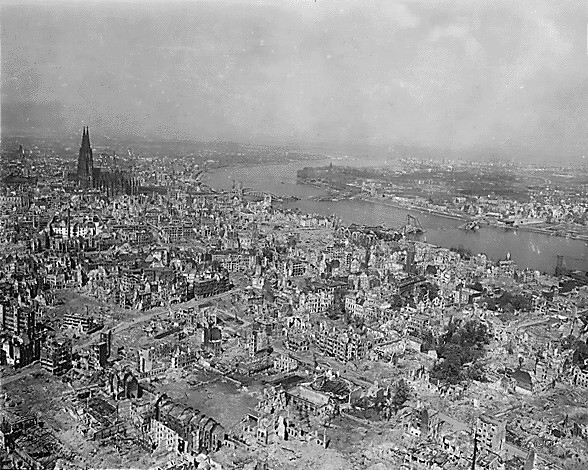
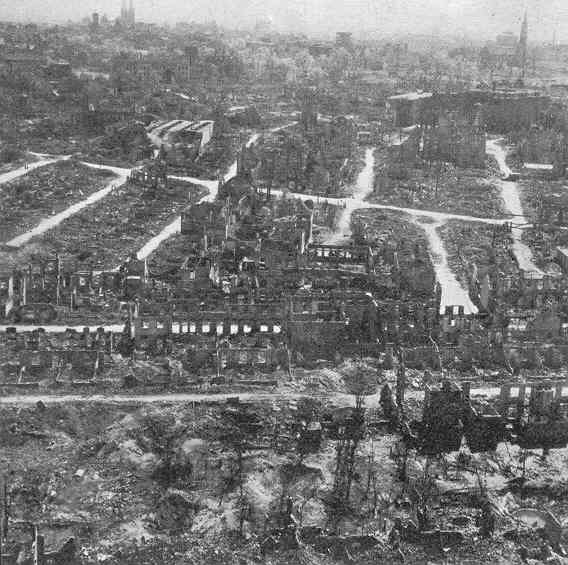
US Army
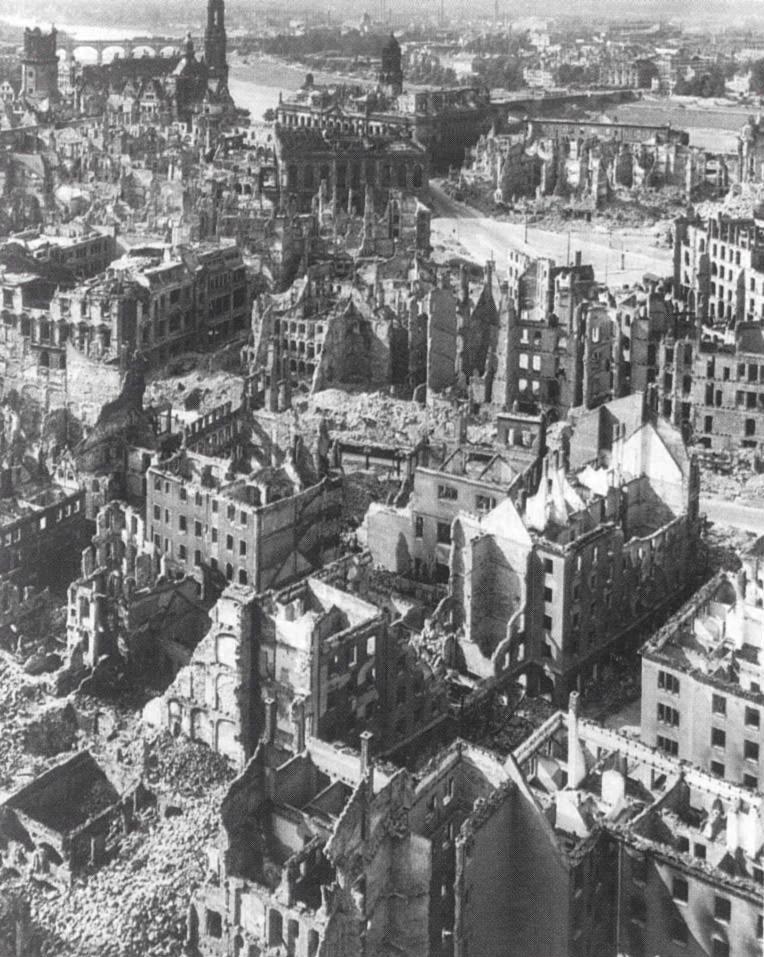
|
Bringing justice to the Allies' former enemy leaders
A major issue facing the victorious Allies was what to do with the leaders of the former Fascist enemies. To a great extent the Italian situation had resolved itself when in late April Mussolini was captured by Italian anti-Fascists (for the second time) and this time shot and then hung up (along with his mistress and a number of his close supporters) for display in a public square in Milan. Hitler had also resolved the question of his fate when at the end of the month he and his long-time mistress, Eva Braun, committed suicide. Also Himmler and Goebbels (and family) had taken the path of suicide. But twenty-four other leaders were arrested and turned over to a special court located at Nuremberg. After lengthy hearings begun in November of 1945, on October 1st, 1946, judgements were handed down: twelve were to be hanged (Air Marshall Goering had hanged himself in his cell just prior to the sentencing; Labor Front head Ley had done so several months earlier), seven were given lengthy prison terms (three for life) and three were acquitted. With this, it seemed that the Allies were ready to move on with their work of reconstituting Germany. Russia was given the go-ahead within its occupation zone in East Germany to strip the land of any and all German industrial equipment it needed in order to rebuild its own war-torn industrial infrastructure. At first Russia was rapid in the dismantling of German industry, although the Soviets eventually slowed down the process when it became apparent that ruining the German economy would leave Russia facing a huge social crisis in Russian-occupied Germany, a crisis that Russia was not ready to handle. Meanwhile in their zones, the British, French, and Americans also undertook to dismantle the German armaments plants, but also slowed up the process when they discovered the same problems the Russians had encountered. Indeed, in the French zone, gradually farming, coal mining, and steel manufacture were encouraged by the French administration, since much of the production and profits were directed toward France.
|
National Archives 238-NT-592.
THE
EUROPEANS STRUGGLE TO SURVIVE AND DIG OUT
Black-market trading between
soldiers and civilians – Berlin Tiergarten – summer 1945
Cameras, household goods
and heirlooms were traded for money or cigarettes –
to then purchase scarce
food
Berliners looking for anything
of value that can be used for barter
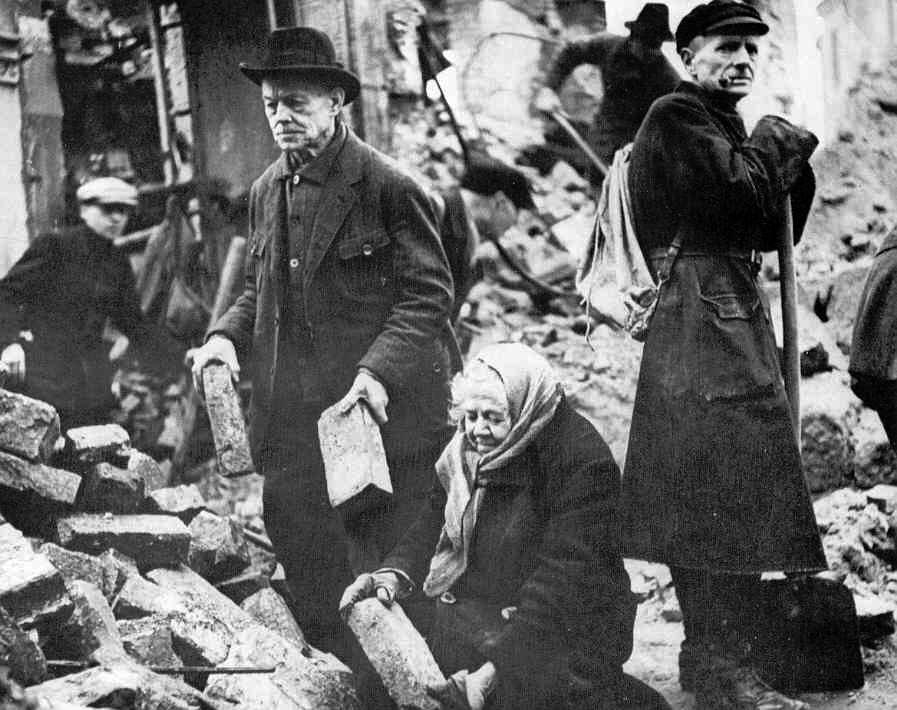
Citizens of Dresden sorting
out useable brick and stone as a volunteer effort to rebuild Germany
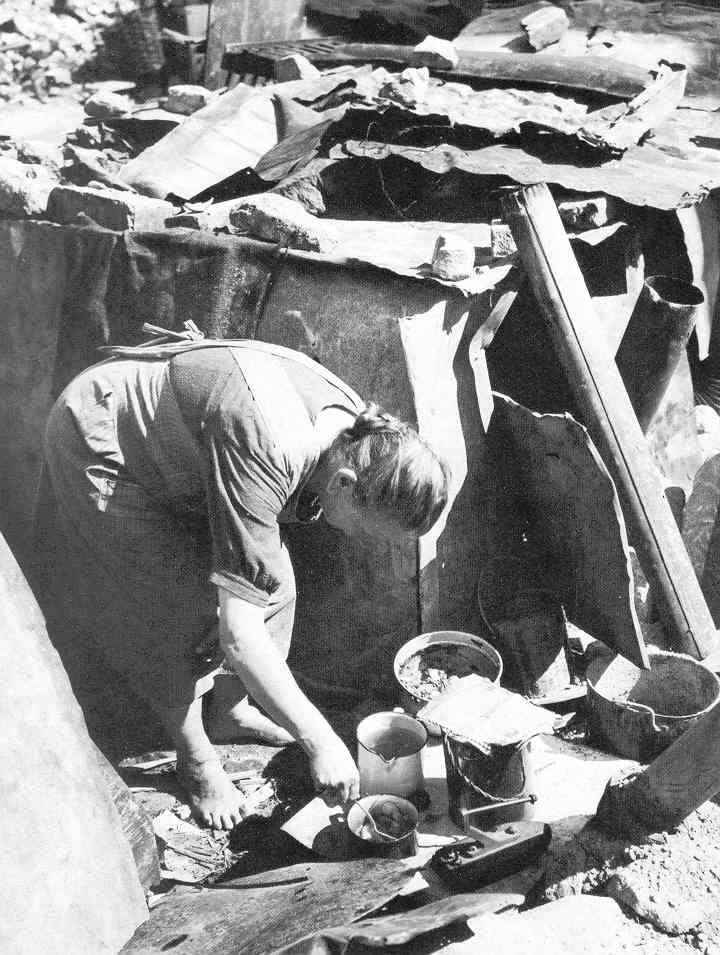
A woman in Nuremberg in a
makeshift home cooking a mix of apples, potatoes and greens
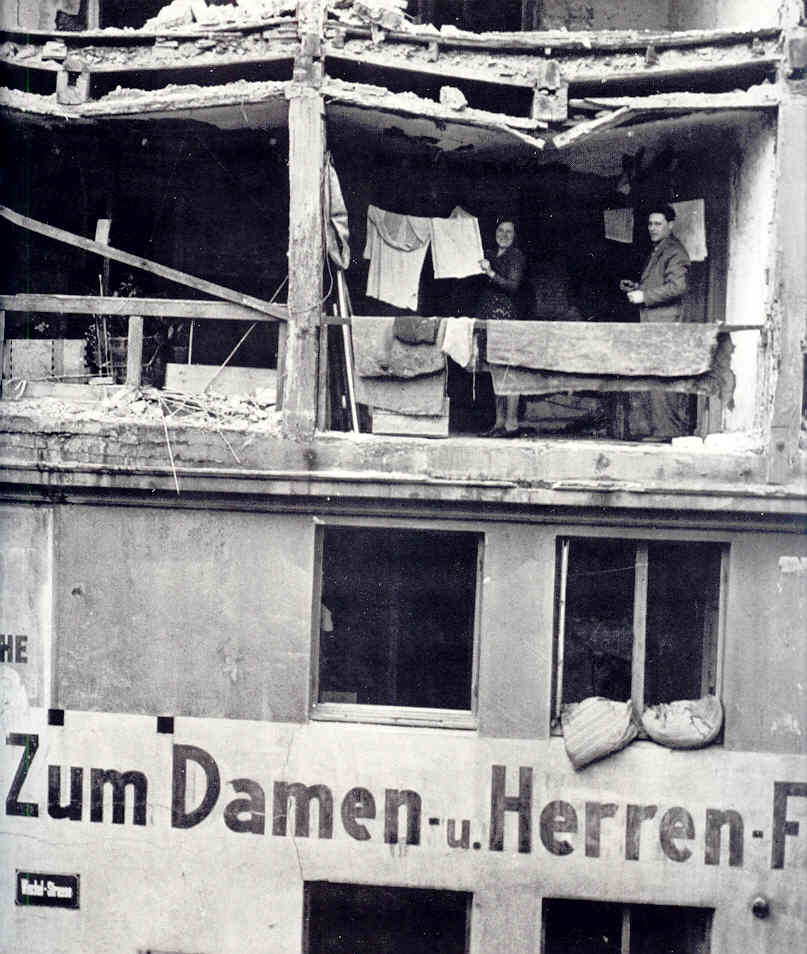
Makeshift life in
Hamburg
Imperial War Museum,
London
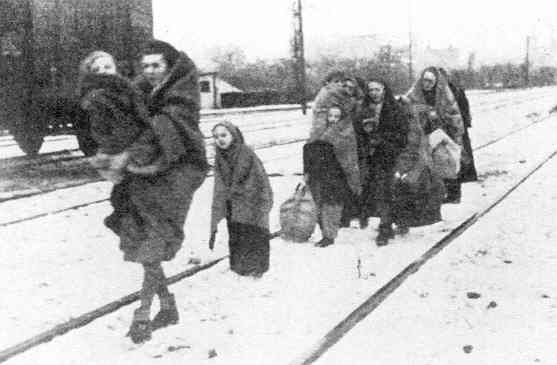
A small group of German women
and children arriving in the British sector of Berlin, October 1945 – the sole survivors of 150
who were expelled from Lodz, Poland, 270 miles away. The mother in front is striding
out ahead, anxious to get help for her 3-year old son.
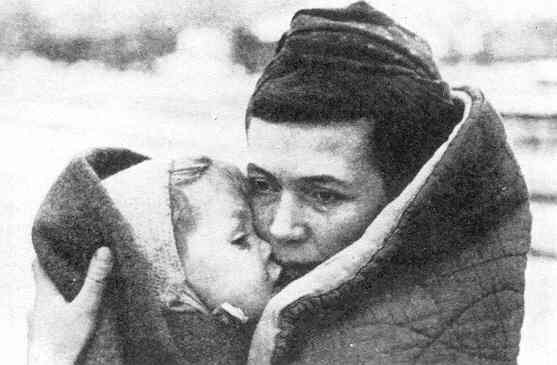
The mother clasps the son
to keep him warm – and then realizes that her son has just died.
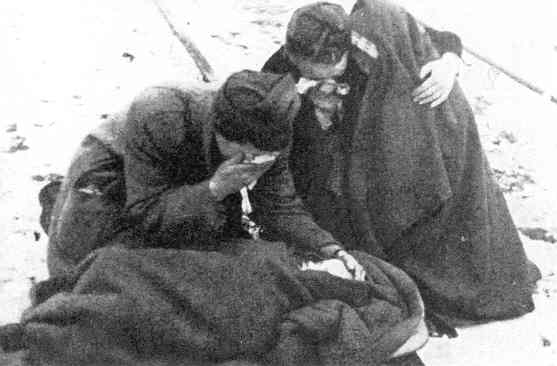
The women grieving as the
boy's head is pillowed on a railroad track
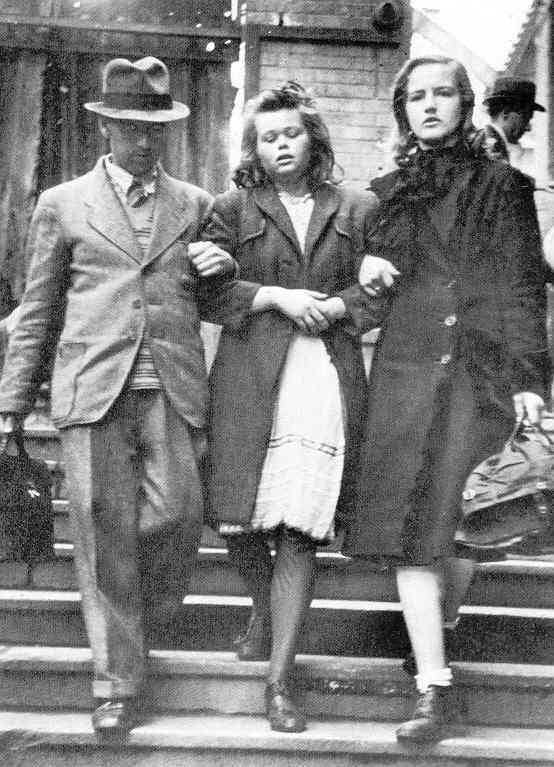
A German girl being led from
a Berlin train station – having been gang-raped by
Polish youths (typically, war orphans) who regularly boarded trains
to rob or rape German refugees fleeing Poland
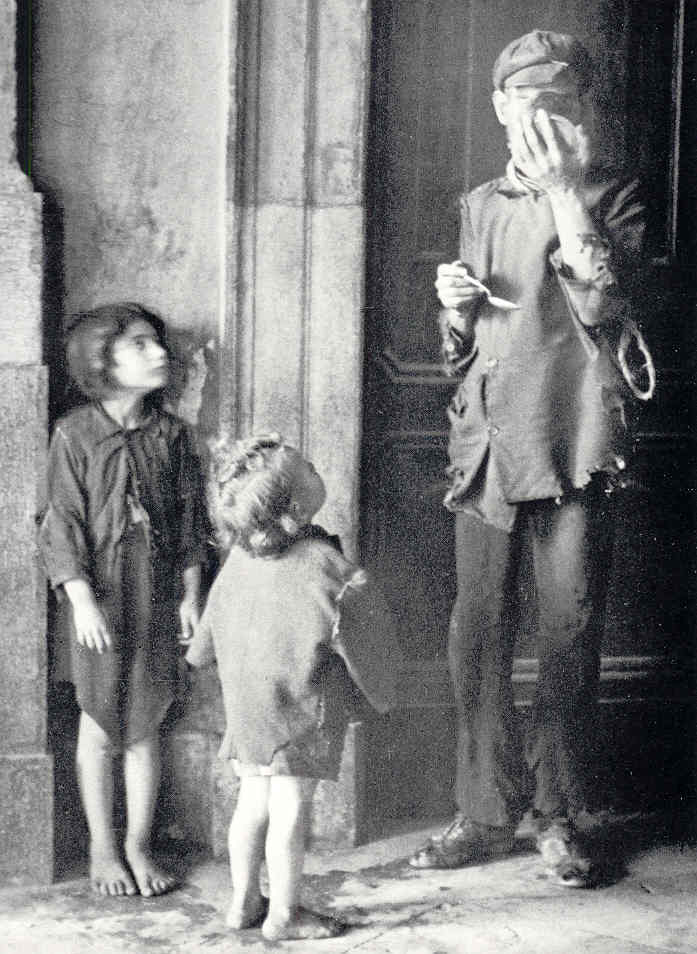
Hunger in Palermo,
Sicily
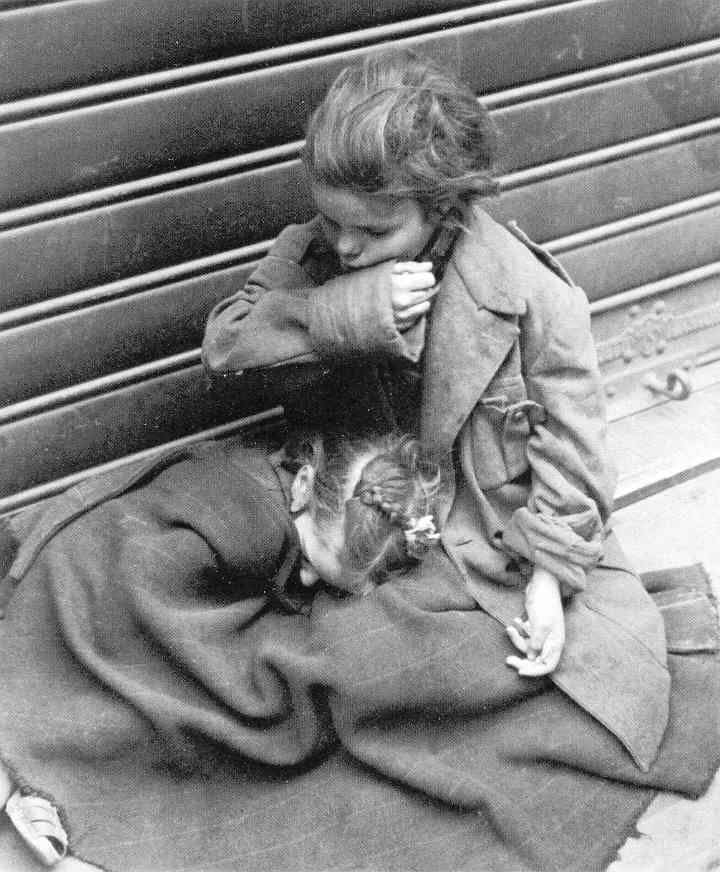
Homeless orphaned sisters
on a street in Rome
Toni Frissell – courtesy
of Frissell Collection, Library of Congress
But somehow life goes on
German farmers and miners
gathering with families and possessions to move from the horribly
overcrowded American sector to the French sector where skilled labor was
actually in short supply
National Archives
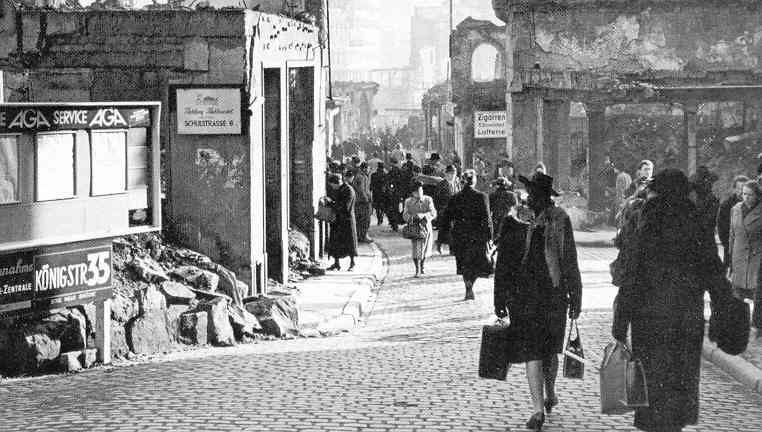
Some citizens of Cologne,
Germany, resuming as much a normal life as possible – though for most life amounted
to a constant search for food, shelter and clothing – 1946
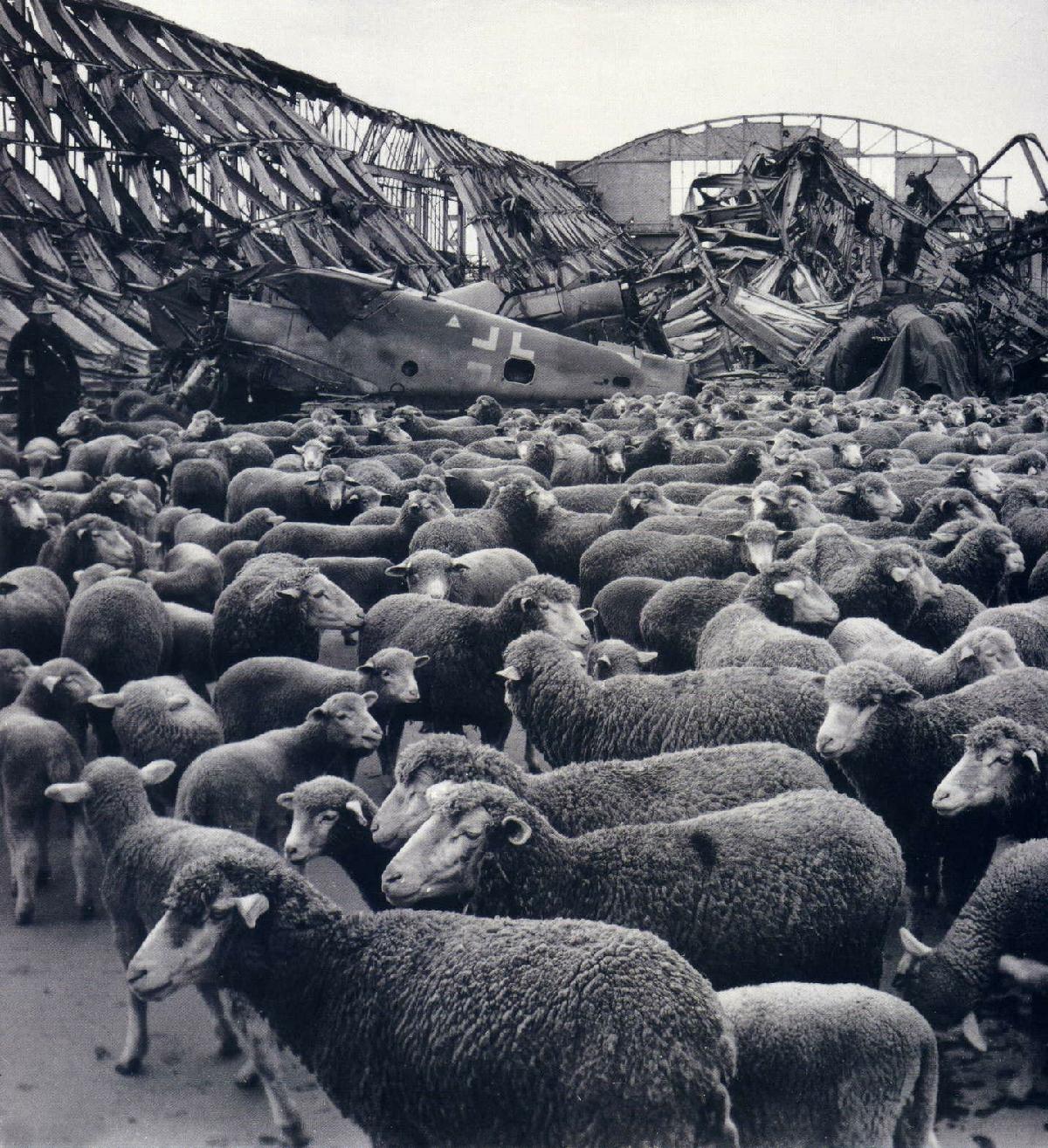
Sheep resuming a normal life
in a bombed out hangar in Leipzig. One quarter of the city was totally flattened
by Allied bombing
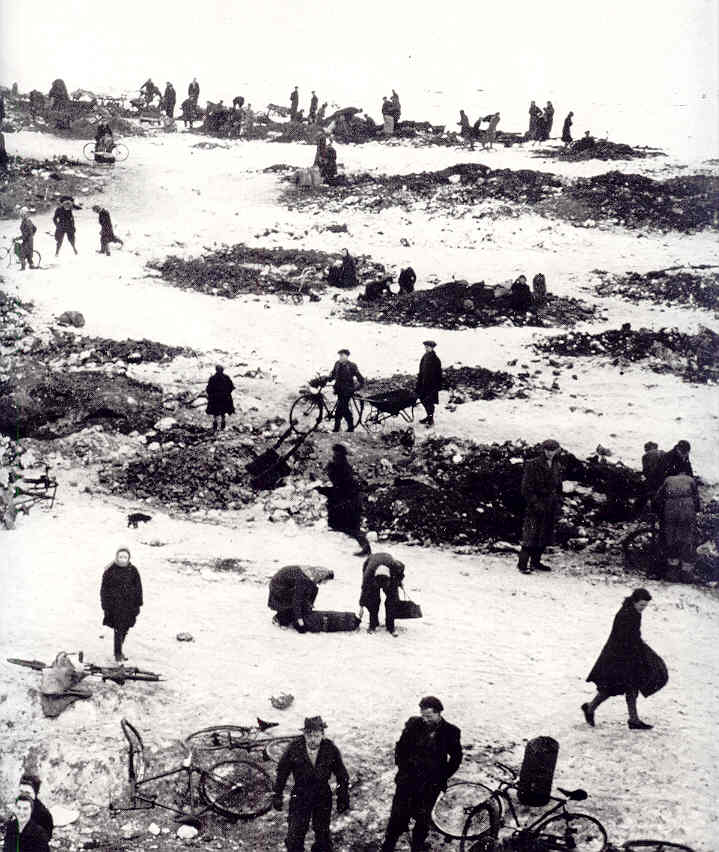
Britishers looking for coal – Feb. 1947. Cold, rundown mines and
lack of transport made the fuel shortage worse than during the War
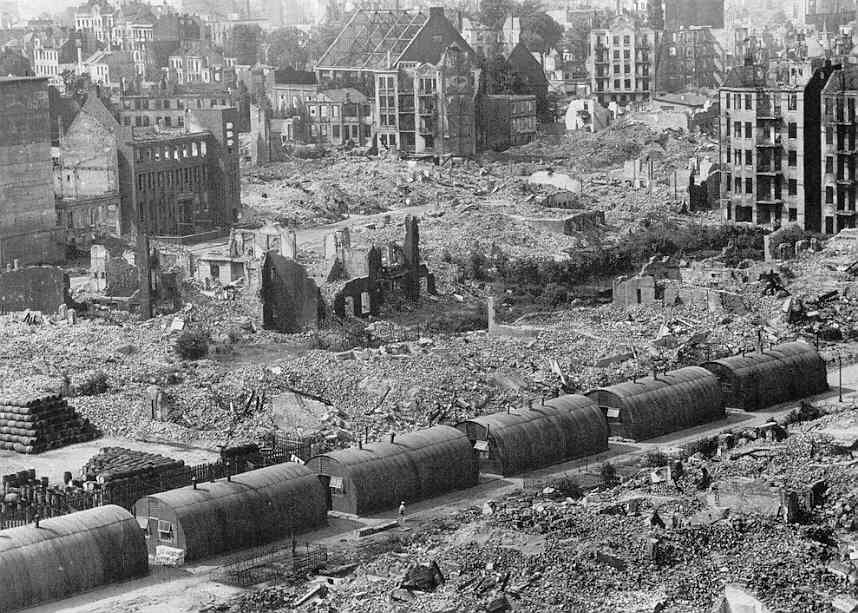
Recovery was not quick:
Hamburg still in Ruins – 1947
THE PEACE TREATIES
WITH THE OTHER FORMER ENEMY NATIONS
As far as the rest of enemy Europe was concerned
(most all of it except Italy under occupation by the Russian Red Army),
the design of the futures of Italy, Austria, Rumania (soon to be termed
Romania), Bulgaria, Hungary and Finland was turned over to a special
Council of the Foreign Ministers of the Big Five. When the Foreign
Ministers finally gathered in Paris (July-October 1946) they found the
going slow in their attempts to find agreement in the handling of these
former enemy nations. Russia wanted the Italian colony of Libya (giving
Russia finally a position on the Mediterranean), but America and
Britain would not back down in their refusal. Russia also wanted a huge
reparations payment ($300 million) from Italy. But that too was blocked
by the Western allies. However the final treaties did provide for
extensive land transfers and large reparation payments to the Allies
(Russia, Yugoslavia, Czechoslovakia, and Greece principally) and a huge
reduction in the size of their former enemies' armed forces. Finland,
which had been attacked by Russia – and consequently found Germany to
be its only practical ally – now had to pay Russia $300 million for
damages and surrender territory to the Russians. And in the end the
Italians were required to pay Russia $100 million, Yugoslavia $125
million, Greece $105 million, and were forced to give up all their
colonies. The city of Trieste, once the most important port city of
Habsburg Austria's empire, and its rich hinterland (inhabited by both
Italians and Slavs), found itself caught between Italy and Yugoslavia
in its post-war assignment. It was finally decided to place Trieste
under United Nations administration.1
1In 1954 the Trieste province would be
divided in half with the western portion, including the city of Trieste
itself, assigned to Italy and the eastern and southern portion assigned
to Yugoslavia (eventually to Slovenia and a smaller section to Croatia)
THE NEW UNITED NATIONS WANTS TO PUT IN PLACE A PEACEFUL WORLD ORDER
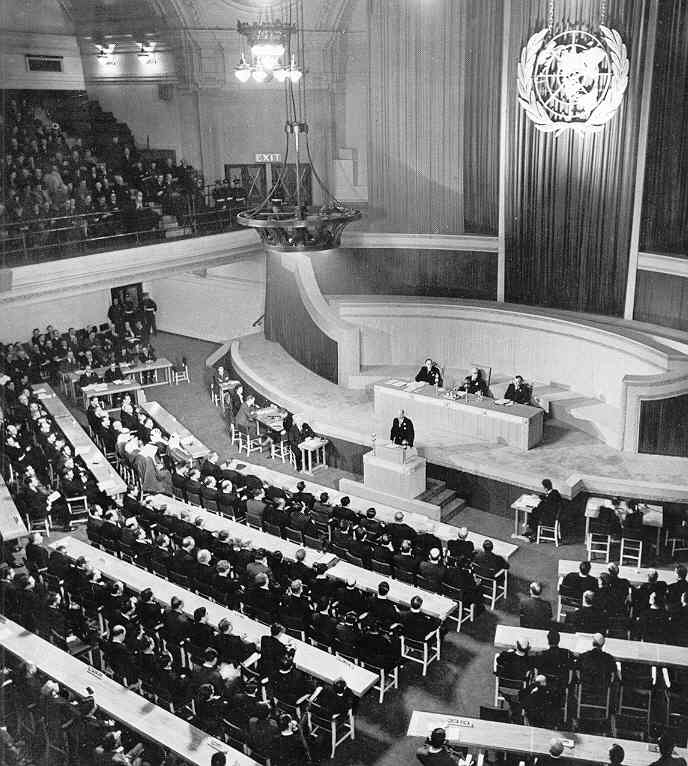
The General Assembly of the
United Nations meets in London – 1946
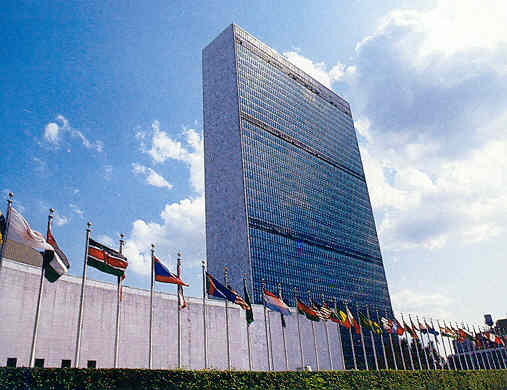
United Nations Headquarters – New York City
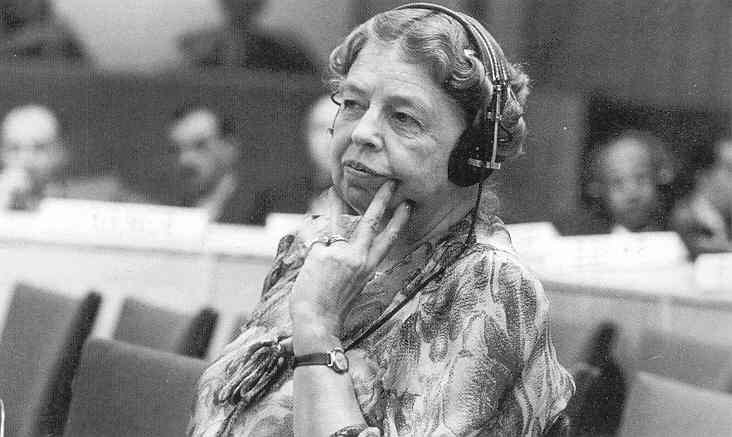
Eleanor Roosevelt – Truman's
representative at the United Nations
United Nations

Go on to the next section: Post-War Europe

THE
EUROPEANS STRUGGLE TO SURVIVE AND DIG OUT |



Imperial War Museum, London






Toni Frissell – courtesy of Frissell Collection, Library of Congress
National Archives




THE PEACE TREATIES WITH THE OTHER FORMER ENEMY NATIONS |
|
As far as the rest of enemy Europe was concerned (most all of it except Italy under occupation by the Russian Red Army), the design of the futures of Italy, Austria, Rumania (soon to be termed Romania), Bulgaria, Hungary and Finland was turned over to a special Council of the Foreign Ministers of the Big Five. When the Foreign Ministers finally gathered in Paris (July-October 1946) they found the going slow in their attempts to find agreement in the handling of these former enemy nations. Russia wanted the Italian colony of Libya (giving Russia finally a position on the Mediterranean), but America and Britain would not back down in their refusal. Russia also wanted a huge reparations payment ($300 million) from Italy. But that too was blocked by the Western allies. However the final treaties did provide for extensive land transfers and large reparation payments to the Allies (Russia, Yugoslavia, Czechoslovakia, and Greece principally) and a huge reduction in the size of their former enemies' armed forces. Finland, which had been attacked by Russia – and consequently found Germany to be its only practical ally – now had to pay Russia $300 million for damages and surrender territory to the Russians. And in the end the Italians were required to pay Russia $100 million, Yugoslavia $125 million, Greece $105 million, and were forced to give up all their colonies. The city of Trieste, once the most important port city of Habsburg Austria's empire, and its rich hinterland (inhabited by both Italians and Slavs), found itself caught between Italy and Yugoslavia in its post-war assignment. It was finally decided to place Trieste under United Nations administration.1 1In 1954 the Trieste province would be divided in half with the western portion, including the city of Trieste itself, assigned to Italy and the eastern and southern portion assigned to Yugoslavia (eventually to Slovenia and a smaller section to Croatia)



United Nations
|
